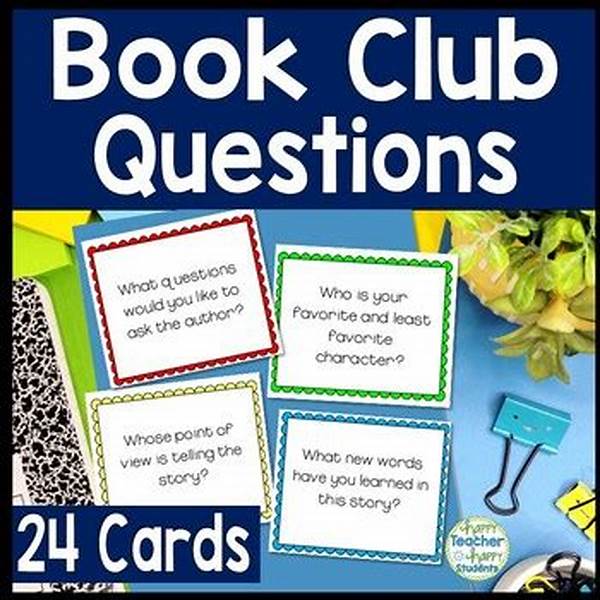When it comes to immersing yourself in a narrative that blends the boundary between fact and fiction, historical fiction stands out as a genre that not only entertains but educates. Imagine this: you’re seated in your cozy living room, a cup of tea in hand, and surrounded by friends who are equally engrossed in the world of the past brought to life by skilled authors. Suddenly, you’re discussing not only the storyline but the real events that inspired it. This is the magic of book clubs dedicated to historical fiction—where the past and the present collide in meaningful discussion.
Read More : Heal Hearts Through Holiday Giving
Whether you’re a reader looking to start a new book club or you’re part of an established group looking to spice up discussions, having the right questions at your disposal can make all the difference. Asking the right questions can clarify complex narratives, deepen understanding, and evoke more engaging conversations. But what makes a question the ‘right’ question? Let’s delve into the art of crafting stimulating book club questions for historical fiction.
Understanding the Importance of Book Club Questions
Delving into the pages of historical fiction, readers find themselves walking alongside figures from the past, exploring ancient alleys, and living through monumental events. But how do we ensure our book club conversations are as rich and vibrant as the stories themselves? The secret lies in asking the right questions. These inquiries serve as a bridge, connecting the reader’s personal experience with the broader context of the novel. They allow for a shared journey, providing insights into both historical events and the human condition.
Historical fiction has the unique ability to transport us to another time, offering perspectives we might never have considered. Our discussions should mirror this richness. By crafting thought-provoking questions, we enable every member to bring their perspective, thus enriching the collective understanding of the book. “Book club questions for historical fiction” aren’t just about recalling facts—they’re about engaging deeply, debating meanings, and exploring the ‘what-ifs’ and ‘whys’ of history.
Crafting Engaging Questions
1. Exploring Themes and Motifs
What are the central themes of the novel? How are these themes brought to life through the characters’ journeys?
2. Character Analysis
How do the protagonists mirror historical figures, and what does their development tell us about the era they’re set in?
3. Historical Context
How accurately does the book depict its historical setting? What liberties has the author taken, and how do they affect our understanding?
4. Moral and Ethical Dilemmas
What moral questions does the book raise, and how are these tied to the historical context of the story?
Read More : Storytime Tips For Improving Toddler Language
5. Symbolism and Imagery
What symbols does the author use to enhance the narrative, and how do they contribute to the historical atmosphere?
Speaking the Language of History
A historical fiction book club is, in essence, an ongoing dialogue between the present and the past. The questions posed aren’t just inquiries; they’re invitations to step into another time, to view the world through new eyes. Asking about the historical accuracy of a novel’s setting can lead to spirited debates about the importance of accuracy versus storytelling. Delving into character motivations might uncover overlooked details that add depth to the plot.
Engage your book club with questions that ignite passion and curiosity. For instance, consider asking, “How might the story have changed if set in a different historical period?” Such questions stimulate creative thinking, encouraging members to step beyond the text and into the realm of hypotheticals.
Creating a Community of History Buffs
The beauty of book clubs lies in community and shared passion. Historical fiction, with its ability to educate and entertain, can serve as the glue that holds your group together. As you navigate the ebbs and flows of each narrative, dissecting them with a set of robust “book club questions for historical fiction,” you foster a community that appreciates the nuances of history and literature alike.
Sample Questions to Inspire
Embrace the stories of yesteryears while creating new narratives in your discussions. Learn from the heroes and heroines of the past to become better readers and historians. After all, every page turned is a lesson learned.
Conclusion: The Art of Questioning
Engaging with historical fiction is more than just reading; it’s an invitation to re-examine history through a new lens. And in your quest for understanding, the questions you ask are as vital as the answers you seek. They hold power—the power to enlighten and challenge, to connect and divide. As you close the chapter on another book club meeting, armed with insights and revelations, remember that the world of history and fiction is vast, with stories waiting to be uncovered, questioned, and understood.
By adopting a probing, inquisitive approach, your book club discussions can evolve from simple gatherings to unearthing complex historical narratives. Equip your club with the right questions, and watch as your literary explorations turn vibrant and educational, forever changing how you see both fiction and history.
